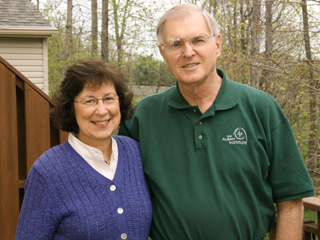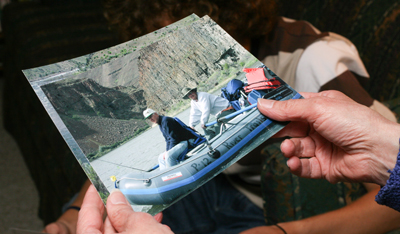James Lapp
jmlapp@comcast.net

It’s hard to say when I first experienced a call to pastoral ministry. Was it as a child playing church on the stairs or imitating my parents going to “ministerial meetings?†Was it in frequently overhearing, right from birth, conversations about church and leadership, including the stresses and joys of Franconia Conference? Might it have been the model of my father and many guest ministers in our home? Maybe it began when I went to college and majored in Bible and gingerly spoke of preparing for “Christian service,†a kind of euphemism for pastoral ministry. Certainly the invitation from Richard Detweiler to serve as a summer intern with him at Perkasie Mennonite Church in 1960 contributed to a growing clarity and sense of call.
The reality is I was part of an era that did not announce plans to someday become a minister. Whatever sense of call I had needed to await the recognition of others and the processes of the church. To be sure, going to seminary signaled a readiness for pastoral leadership. This openness to ministry was first affirmed and confirmed in the fall of 1961 when I was called to pastor Belmont Mennonite Church in Elkhart, IN, and licensed by Indiana-Michigan Mennonite Conference. Ordination on July 7, 1963, followed graduation from seminary and acceptance of the call to serve as pastor at Perkasie. At the time I was the only minister active in Franconia Conference with a full seminary education.
Much has changed during these past 44 years in Franconia Conference. Education is now an expectation, with core courses a conference requirement for credentialing. While we have long had a history of plural ministry (“the bench†as it was called), the whole concept of team ministry pushes this model to new levels often not experienced in the older forms of plural ministry. We also seem to call fewer younger people to ministry. It is almost unthinkable now to have a 19 year old, or even 24 year old pastor like I was when first licensed. The phenomenon of adolescence and young adult years has modified the processes of calling leaders in the church. Or has the church become less willing to risk with inexperienced leaders?
Certainly the thought of women becoming credentialed leaders seemed remote in these early years of my ministry. To have been married to an ordained minister (my first wife Nancy), and now married to an active pastor, Mim Book, as well as to have a daughter, Cindy, ordained to pastoral leadership, creates a new reality for the church and for me personally. I am gathering feelings, insights and ideas about being a pastor’s spouse that I someday may decide to publish. I reflect with much joy and satisfaction on my years as a minister. After 20 years as a congregational pastor, Nancy and I served as campus ministers at Goshen College for a number of years. Perhaps the title “church bureaucratic†best characterizes my denominational leadership from 1987-95. Having left Franconia Conference in 1972, I returned in 1996 to serve as Conference
Pastor. It is hard to imagine a better context for my last long-term ministry function. Joining the conference staff team, working closely with overseers and pastors, and eventually leading the conference ministry team resulted in much joy and fulfillment.
To be sure, these past 11 years were also not without their challenges. Three years after we moved to Southeastern Pennsylvania, Nancy died of multiple myeloma. During the same era the conference struggled with relationships with Germantown Mennonite Church. There are times when I wonder which was more painful as both resulted in significant grief and loss.
As I near the decade of three score and ten, I sense the call to a new transition. Thus far I have resisted speaking of retirement. Rather I imagine a life with less demands, more flexibility, and opportunities for ministry that are life-giving and make good use of my gifts. For starters, after 25 years I am returning to a half-time pastoral leadership role for five months at Blooming Glen church (April through August). Frankly this new challenge stimulates me. At this stage of life, freedom in preaching and limiting ministry to the things I most enjoy, seems appealing. There need to be some perks that go with aging!
My resignation from the conference staff coincides with the dawn of a new season. Seasons of change are usually accompanied by some stress and uncertainties. The changes at Franconia Conference will be no different, however it is clear that the 21st century necessitates fresh strategies for ministry. The models we have used, including the conference ministry team I led, were largely borrowed from mainline churches, and have likely reached their maximum potential. How to retain the important values of older systems while adapting to new forms of leadership is the challenge. New leaders with familiar faces will best discern and discover creative ways to make this happen.
Meanwhile, to use Biblical language, I “watch and pray†for the dawning of the Kingdom of God in greater fullness. We have only begun to develop a “culture of call†in the conference and most of our congregations. I am impressed with younger women and men who exhibit high commitment to Christ and the church and hold strong promise that will surely result in a positive future. It is exciting to anticipate a record ten Ministry Inquiry Program participants (college students) connected to our conference this coming summer. The 2007 winter issue of Growing Leaders with the four articles by younger leaders bodes well for the future of the church.
I confess to impatience with the obstacles that women experience in fulfilling their call and excising the gifts of the Holy Spirit in their lives. I sense the old assumptions around leadership and authority in the church are being called into question and our quest for greater leadership effectiveness necessitates discernment for a new consensus around the values and patterns that will best serve us as God’s people. I applaud the greater professionalization of leadership while caution against emphasizing style over substance in our leadership practices.
Being at this stage of life invites self-critique about how and where I have invested my energy and gifts. Mostly I feel a deep sense of reward for the opportunities I have been accorded. I never imagined the path God’s call in my life would take as I view it in retrospect. While I have regrets about some specific actions on my part, I mostly reflect on these years with gratitude and joy. And to realize, like Paul, that I have not “reached the goal,†I continue to press on toward the “prize of the heavenly call of God in Christ Jesus.†(Philippians 3:14) To now leave the work of Franconia Conference in the hands of others brings personal freedom seasoned with confidence in new generations of leadership that will follow. Thanks for the privilege of being a co-worker with so many of you during this past decade of ministry. I will always treasure these relationships and the trust I have been shown.

James M. Lapp officially ended his term as Senior Ministry
Consultant with Franconia Conference on March 30.
The opinions expressed in articles posted on Mosaic’s website are those of the author and may not reflect the official policy of Mosaic Conference. Mosaic is a large conference, crossing ethnicities, geographies, generations, theologies, and politics. Each person can only speak for themselves; no one can represent “the conference.” May God give us the grace to hear what the Spirit is speaking to us through people with whom we disagree and the humility and courage to love one another even when those disagreements can’t be bridged.

Hey Jim, what a lovely piece. I will say “yes” in answer to the ending question in your third paragraph. -sheldon scgood@mosaicmennonites.org
Dear Jim,
I was blessed this evening reading your reflections on called into ministry. I have Nancy to thank who found the web page and called my attention to it. I’m looking forward to our getting together in July at Wernersville. Today I returned to my medical pradctice and am so thankful for the opportunity to bring closure to this part of my medical practice this month. I’m really doing well in my recovery. God is good.
Bob